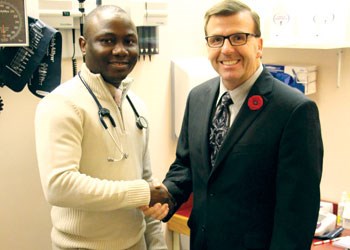The Sunrise Health Region has recently welcomed its 17th doctor from the Saskatchewan International Physician Practice Assessment (SIPPA) program. Dr. Olaitan Fajimi began practice in Yorkton recently, and is currently taking patients.
Fajimi is originally from Nigeria, and has been practicing for seven years. He says he has always worked in primary health, in smaller regions. When he heard about the SIPPA program, he thought it would be an easy transition to move to rural Saskatchewan.
"I said that would be worth trying, in a place that would be small in a place where people watch out for each other and we get to know who we take care of, just like what we are used to."
It took two attempts to get accepted to SIPPA Fajimi admits, but not because of medical knowledge. The program also focuses on knowledge of Canadian culture, which Fajimi says he didn't focus on in the first attempt, but that learning about it has made his actual practice much easier.
"That can be quite challenging for someone coming from Africa. But, after passing through SIPPA and knowing what is required it's made practicing in Saskatchewan really smooth."
The transition to working in the province has been going well, Fajimi says, with a steadily growing client base and plenty of support as his family settles into the region.
"I see a bright and assuring future in practice in Saskatchewan."
He says he wants to make his practice a welcoming one, and prioritize the patient-doctor relationship.
Minister of Rural and Remote Health Greg Ottenbreit says that the SIPPA program has been a success for the province, with 150 graduates in the province overall, 96 per cent in rural areas.
He says the real success has been that the doctors stay, and that the program is designed to have doctors become a permanent part of the province.
That's reflected in Fajimi's experience, Ottenbreit notes, as having the cultural component means doctors will continue to practice in Saskatchewan, while before many doctors would be frustrated after being thrust into an unfamiliar environment.
Part of several programs in recruitment and retention of physicians in the province, Ottenbreit says that province is playing catch up to try to meet the demand throughout the health regions.
While he says training local doctors is the top priority, it's not enough, and SIPPA and doctors like Fajimi are vital for meeting the needs of the province.
"There's a huge need, we can't train enough doctors."




